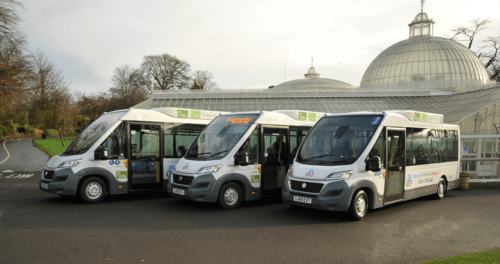
Community Transport Association (CTA) Director for Scotland David Kelly has called for a reform of the Network Support Grant (NSG, the successor to the Bus Services Operators’ Grant), which he says is essential funding for Scotland’s Community Transport sector. Over one in three of the country’s community transport operators claim NSG, he says, which is available to both commercial and community bus operators to support the bus network.
David says that the ongoing review of NSG by Transport Scotland, which is aiming to ensure it continues to provide value for money, and whilst Transport Scotland considers other opportunities to improve bus services, represents an opportunity to rethink, reform and improve the grant to ensure it is fair, flexible and fit for purpose to maximise the social, economic and environmental benefits for taxpayers and passengers.
Listening to its members across Scotland, the CTA gathered data, evidence and views about how they feel reform can best be achieved, and has compiled a report which it hopes will help to direct the review towards the best outcome. According to David, one major issue relates to the new Fair Work First conditionality which will be attached to all public sector grants from 1 April, which he says will be challenging for some community transport operators to achieve in the short-term, meaning that some exceptions are likely to be required. 14% of operators who currently pay at least the real Living Wage say they are unlikely to be able to afford to continue to do so in 2024/25, when it is due to the increase to £12 per hour, he says, noting that fair work and fair funding are inextricably linked, and that operators’ ability to deliver fair work and pay is constrained by a lack of fair funding which covers those costs.
Members also raised concerns over the ineligibility of smaller vehicles, which are an integral part of Scotland’s transport network, as a significant barrier, he revealed, given that many community transport operators use smaller vehicles with fewer than nine passenger seats to deliver essential transport services, especially in rural, remote and island communities and in accessible transport for disabled people, adding that around 59% of smaller vehicles deliver transport services which replace withdrawn bus services but which are denied funding through NSG. This, he says, incentivises the use of larger vehicles to deliver services when it is not necessary, making them less accessible, cost-effective, efficient and sustainable.
Concerns about communication and administration were also noted.
The CTA is therefore calling for fair funding, by ensuring that NSG reflects the true (and changing) costs of delivering transport projects and services for operators, and to ensure Fair Work First is fully funded by public sector grants, including annual inflation-based uplifts.
It also wished to see eligibility for smaller vehicles, with a reform to NSG based on passenger class rather than vehicle type, to extend eligibility and a rethink of NSG’s purpose to ensure it evolves to keep pace with changes in the transport network to support more flexible modes, including the use of cars, MPVs and minibuses where suitable, as well as volunteer car schemes and DRT in addition to traditional commercial and community bus routes.
At the same time, better communication and administration are needed, he says, to improve the administration of NSG through direct and timely engagement and clearer guidance.

